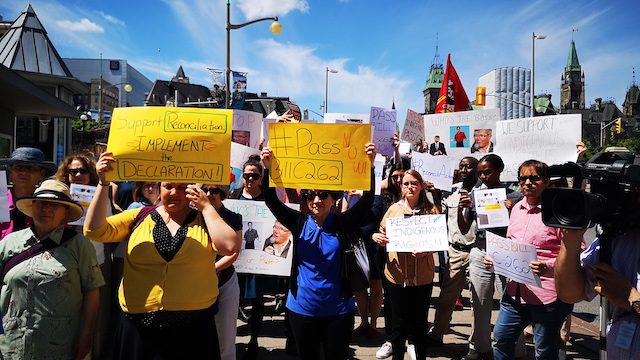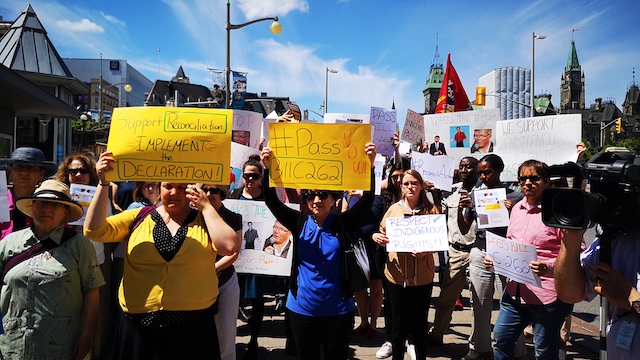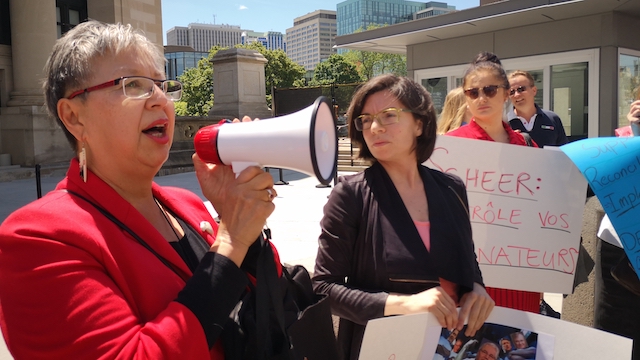

Justin Brake
Todd Lamirande
APTN News
The Senate must pass Bill C-262.
That was the message delivered outside the Senate of Canada Wednesday morning in Ottawa, where NDP political staffers, Assembly of First Nations staff, NDP MP Nikki Ashton and grassroots people gathered to advocate for the swift passage of Cree MP Romeo Saganash’s private member’s bill on Indigenous rights.
“We are not just asking. We are not just urging. We are demanding that they stand up for Indigenous rights, for human rights, for Indigenous peoples, and for all Canadians who believe that we must go forward, we must support Bill 262,” Ashton said, calling for people to hold Senators, MPs and the prime minister to account.
(“As you know it’s been a real struggle to get this bill through,” Independent Senator Lillian Dyck told the crowd gathered outside the Senate. Photo: Justin Brake/APTN)
The proposed United Nations Declaration on the Rights Of Indigenous Peoples Act is caught in the middle of a heated dispute in Canada’s upper chamber, where Independent and Conservative Senators have squared off over the legislation many believe would significantly improve the quality of life for Indigenous people in Canada.
If passed in its present form, C-262 would require Canada “to take all measures necessary to ensure that the laws of Canada are in harmony with the United Nations Declaration on the Rights of Indigenous Peoples,” according to the bill’s current text.
But Conservative senators are demanding a length of debate that would effectively kill the bill on the order paper when Parliament rises for summer break later this month.
They maintain the legislation could have unintended legal and economic consequences.
On Tuesday the Senate’s Aboriginal Peoples standing committee voted to move C-262 without amendment to the third and final reading, giving the private member’s bill an against-the-odds chance of becoming law.
But in the heated rush to beat the clock, Conservative senators are accusing Indigenous and Independent senators of impeding free speech and breaking Senate rules, while some are accusing the Conservatives of running out the clock.
“I’m disappointed that we are rushing ahead with consideration of this bill without many important questions having been clearly answered,” Northwest Territories Senator Dennis Patterson said Tuesday morning as exchanges among senators in committee heated up.
Watch Todd Lamirande’s story on the debate in the Senate over Bill C-262
Last year the House of Commons’ Standing Committee on Indigenous and Northern Affairs heard from 71 experts and witnesses during 11 meetings over almost four months.
The bill, first introduced by Saganash in 2016, was passed without amendment and referred to the Senate, where C-262 proponents say Conservative senators have employed delay tactics to stall the bill’s progress.
On Tuesday the Conservatives proposed amendments to each of the short bill’s six clauses, plus the addition of a seventh clause.
Clause 2 of the bill affirms that C-262 cannot “diminish or extinguish existing Aboriginal or treaty rights of the Aboriginal peoples of Canada that are recognized and affirmed” in the Canadian constitution.
Patterson said Tuesday, “there should be a provision that passage of this bill will also not have the effect of increasing or expanding such rights.”
Each of the Conservatives’ proposed amendments was voted down by the majority Independent senate committee, and committee members voted on a five-minute time limit for each senator to speak to the proposals.
Saskatchewan Conservative Senator David Tkachuk accused Senator Lillian Dyck, the committee chair, of impeding the Conservatives’ freedom of speech.
As Dyck attempted to hold a vote on one of the Conservatives’ proposed amendments, Tkachuk spoke over her and read aloud a letter from Alberta United Conservative Party Premier Jason Kenney to Justin Trudeau warning against the passage of C-262 and its perceived threat to economic interests.
Senator Murray Sinclair, the bill’s Senate sponsor, told APTN News he and his colleagues were ensuring the committee’s plan to deal with C-262 in a timely manner was fulfilled.
“There had been agreement at the outset by the committee that we would deal with this bill in four meetings, and this was our fourth meeting,” he said.
Patterson, the bill’s Senate critic, told APTN Tuesday that he planned to raise a question of privilege in the Senate chamber Tuesday evening, and to ask for the bill to be returned to committee.
“It’s not at all appropriate to limit debate on amendments, especially for the critic of the bill.”
“I’m very concerned about the time allocation and the fact that my ability to speak was denied.”
Patterson’s question of privilege Tuesday afternoon prompted a debate that carried into the evening.
NDP MP Nikki Ashton speaks at a rally outside the Senate Wednesday morning, urging all Senators and MPs, incl Justin Trudeau, to advocate for the passage of #UNDRIP bill C-262, which has met resistance from Conservative Senators. @APTNNews #cdnpoli pic.twitter.com/O39n1uzJjf
— Justin Brake (@berrygrounds) June 12, 2019
After hearing arguments from those who believed Dyck and the Aboriginal Peoples committee broke procedural rules, and arguments from those who believe the accusations are part of the Conservatives’ effort to orchestrate the end of Bill C-262, Senate Speaker George Furey reserved his decision.
The declaration represents the global minimum human rights standards for Indigenous peoples and has been ratified by the UN General Assembly, and by Canada.
On Tuesday a coalition of First Nations and human rights groups issued a joint statement refuting the claim that the bill has been rushed, and that its passage into law could have negative impacts on the economy.
“Bill C-262 calls for a process by which federal laws can be reviewed in a systematic and collaborative way to ensure that Canada’s commitment to uphold the UN Declaration is being met. It would be up to Parliament to enact any required legislative changes identified in this process,” says the statement, signed by Amnesty International, the First Nations Summit, the Assembly of First Nations, the Metis Nation, and others.
“Because there is no basis for claims that C-262 has been rushed, our Nations and organizations call on all Senators to ensure the Bill is brought to a vote in a timely fashion and passed into law during this session of Parliament.
“If, instead, some Senators continue to employ procedural tactics to essentially kill the Bill, and oppose the human rights of Indigenous peoples, this will be a very regressive and shameful landmark in the history of the Parliament of Canada.
Dyck stopped at Wednesday’s rally on her way into the Senate.
“As you know it’s been a real struggle to get this bill through the Aboriginal Peoples committee,” she said, citing Conservative resistance.
“Keep up the talking, keep up the protest, because this bill is so important,” she added. “We cannot let it die.”
@justinbrakenews










